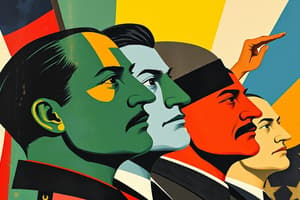Podcast
Questions and Answers
Marxism and Nazism are both expressions of rationalistic philosophy.
Marxism and Nazism are both expressions of rationalistic philosophy.
False (B)
Hannah Arendt's interpretation of totalitarianism suggests that it is an unprecedented phenomenon in history.
Hannah Arendt's interpretation of totalitarianism suggests that it is an unprecedented phenomenon in history.
True (A)
The ideological foundation of totalitarian states is solely based on the concept of democracy.
The ideological foundation of totalitarian states is solely based on the concept of democracy.
False (B)
Concentration camps serve as a laboratory for totalitarian ideologies to practice their values and worldview.
Concentration camps serve as a laboratory for totalitarian ideologies to practice their values and worldview.
Signup and view all the answers
Totalitarianism is largely related to the exclusion of ethnic minorities and stateless persons by the modern State.
Totalitarianism is largely related to the exclusion of ethnic minorities and stateless persons by the modern State.
Signup and view all the answers
The concept of totalitarianism was first established by Soviet power in 1917.
The concept of totalitarianism was first established by Soviet power in 1917.
Signup and view all the answers
Giovanni Amendola believed that fascism imposed moral adhesion along with obedience from its citizens.
Giovanni Amendola believed that fascism imposed moral adhesion along with obedience from its citizens.
Signup and view all the answers
Fascism regarded the label of totalitarianism as a negative term.
Fascism regarded the label of totalitarianism as a negative term.
Signup and view all the answers
Mussolini described the totalitarian goals of fascism as being pursued timidly.
Mussolini described the totalitarian goals of fascism as being pursued timidly.
Signup and view all the answers
Giovanni Gentile is credited with formulating a significant definition of totalitarianism within the fascist context.
Giovanni Gentile is credited with formulating a significant definition of totalitarianism within the fascist context.
Signup and view all the answers
Victor Serge was a supporter of Mussolini's fascist regime.
Victor Serge was a supporter of Mussolini's fascist regime.
Signup and view all the answers
The Russian Revolution did not lead to any political reflections by Victor Serge.
The Russian Revolution did not lead to any political reflections by Victor Serge.
Signup and view all the answers
Amendola claimed that fascism was a 'totalitarian system' in the year 1923.
Amendola claimed that fascism was a 'totalitarian system' in the year 1923.
Signup and view all the answers
Serge believed that the degeneration of the revolution began with the Bolshevik revolution.
Serge believed that the degeneration of the revolution began with the Bolshevik revolution.
Signup and view all the answers
Simone Weil viewed totalitarian regimes as significantly different from past authoritarian states.
Simone Weil viewed totalitarian regimes as significantly different from past authoritarian states.
Signup and view all the answers
Boyar was killed in Mexico by the order of Lenin.
Boyar was killed in Mexico by the order of Lenin.
Signup and view all the answers
Raymond Aaron categorized totalitarianism as fundamentally different from previous forms of power.
Raymond Aaron categorized totalitarianism as fundamentally different from previous forms of power.
Signup and view all the answers
Totalitarianism emerged as a concept primarily after World War II.
Totalitarianism emerged as a concept primarily after World War II.
Signup and view all the answers
According to Weil, the Bolsheviks improved the old regime's repressive institutions.
According to Weil, the Bolsheviks improved the old regime's repressive institutions.
Signup and view all the answers
The work 'Destin d'une revolution' was authored by Raymond Aron.
The work 'Destin d'une revolution' was authored by Raymond Aron.
Signup and view all the answers
The interpretations of totalitarianism discussed were created by political militants.
The interpretations of totalitarianism discussed were created by political militants.
Signup and view all the answers
Study Notes
Totalitarianism's Emergence
- Soviet Union established totalitarian regime in 1917, but concept emerged in Italian anti-fascist circles to define fascism's power.
- Giovanni Amendola, an Italian antifascist, argued in 1923 that fascism was a totalitarian system due to its absolute domination.
- Fascism's intention encompassed not just obedience but also moral adhesion from citizens – considered a political religion.
- Fascists didn't view "totalitarian" as a negative label but a positive descriptor of their ideology, signifying their merit as a superior, totalising system.
- Mussolini, in 1925, expressed the savage totalitarian goals of fascism, seeking greater ferocity in their pursuit.
Defining Totalitarianism
- Giovanni Gentile, a philosopher, provided a key definition of totalitarianism, stating that the state encompassed all aspects of life.
- For fascists, humanity and spirituality held no value outside the state, seeing the state as the ultimate synthesis and unity of all values.
Totalitarianism's History and Interpretation
-
Victor Serge, a Russian political thinker, reflected on the degeneration of the Russian Revolution and posited that its decline began with the Bolshevik revolution, marking it as unprecedented.
-
Several interpretations of totalitarianism arose after World War II, challenging scholars to clearly define its relationship with modernity.
-
Simone Weil's interpretation argued that totalitarian regimes weren't fundamentally different from pre-existing authoritarian ones: They perfected rather than genuinely altered previous oppressive structures..
-
Raymond Aron, contrasted with Weil, believed totalitarian regimes were fundamentally new, expressing distinctly different forms of ideology that differed significantly from previous eras.
-
Hannah Arendt considered totalitarianism a unique form characterized by terror and consensus built upon an unprecedented ideology.
Studying That Suits You
Use AI to generate personalized quizzes and flashcards to suit your learning preferences.
Related Documents
Description
Explore the emergence and definition of totalitarianism, particularly within the context of Fascism in Italy. This quiz delves into the ideas of key figures like Giovanni Amendola and Giovanni Gentile, highlighting how totalitarianism was both perceived and embraced by fascist ideology.




